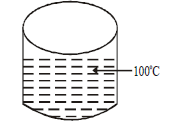Question
What is the amount of heat ( in Joules ) absorbed by $$18\,g$$ of water initially at room temperature heated to $${100^ \circ }C?$$ If $$10\,g$$ of $$Cu$$ is added to this water , than decrease in temperature ( in Kelvin ) of water was found to be? $$C\left( {p,m} \right)$$ for water $$75.32\,J/mol\,K;C\left( {p,m} \right)$$ for $$Cu = 24.47\,J/mol\,K.$$
A.
5649, 369
B.
5544, 324
C.
5278, 342
D.
3425, 425
Answer :
5649, 369
Solution :
$$\eqalign{ & 18\,g\,\,{\text{of water at}}\,\,{100^ \circ }C? \cr & 10\,g\,\,{\text{of }}Cu{\text{ at}}\,\,{\text{2}}{{\text{5}}^ \circ }C\,\,{\text{is added}}{\text{.}} \cr} $$

$$\eqalign{ & {q_p} = {C_{p,m}}\,dT \cr & = 75.32 \times \frac{J}{{K\,mol}} \times \frac{{18g}}{{\frac{{18g}}{{mol}}}}\left( {373 - 298} \right)K \cr & = 75.32\frac{J}{K} \times 75\,K \cr & = 5.649 \times {10^3}J \cr & {\text{If now 10}}g{\text{ of copper is added}} \cr & {C_{p,m}} = \frac{{24.47\,J}}{{mol\,K}} \cr & {\text{Amount of heat gained by }}Cu \cr & = 24.47\frac{J}{{K\,mol}} \times \frac{{10g}}{{\frac{{63g}}{{mol}}}}\left( {373 - 298} \right)\,K \cr & = 291.3\,J \cr & {\text{Heat lost by water = 291}}{\text{.30 J}} = 291.30\,J \cr & - 291.30\,J = 75.32\frac{J}{K} \times \left( {{T_2} - 373\,K} \right) \cr & \Rightarrow - 3.947\,K = {T_2} - 373\,K \cr & \Rightarrow {T_2} = 369.05\,K\, \cr} $$
$$\eqalign{ & 18\,g\,\,{\text{of water at}}\,\,{100^ \circ }C? \cr & 10\,g\,\,{\text{of }}Cu{\text{ at}}\,\,{\text{2}}{{\text{5}}^ \circ }C\,\,{\text{is added}}{\text{.}} \cr} $$

$$\eqalign{ & {q_p} = {C_{p,m}}\,dT \cr & = 75.32 \times \frac{J}{{K\,mol}} \times \frac{{18g}}{{\frac{{18g}}{{mol}}}}\left( {373 - 298} \right)K \cr & = 75.32\frac{J}{K} \times 75\,K \cr & = 5.649 \times {10^3}J \cr & {\text{If now 10}}g{\text{ of copper is added}} \cr & {C_{p,m}} = \frac{{24.47\,J}}{{mol\,K}} \cr & {\text{Amount of heat gained by }}Cu \cr & = 24.47\frac{J}{{K\,mol}} \times \frac{{10g}}{{\frac{{63g}}{{mol}}}}\left( {373 - 298} \right)\,K \cr & = 291.3\,J \cr & {\text{Heat lost by water = 291}}{\text{.30 J}} = 291.30\,J \cr & - 291.30\,J = 75.32\frac{J}{K} \times \left( {{T_2} - 373\,K} \right) \cr & \Rightarrow - 3.947\,K = {T_2} - 373\,K \cr & \Rightarrow {T_2} = 369.05\,K\, \cr} $$